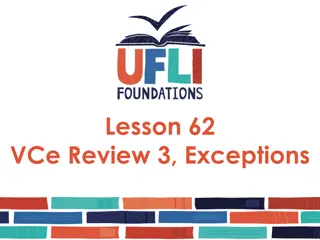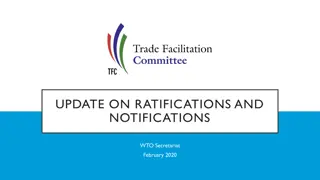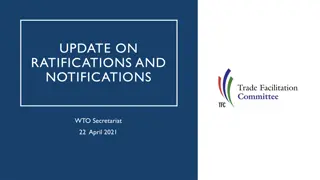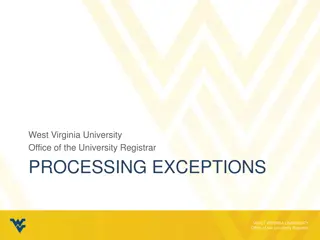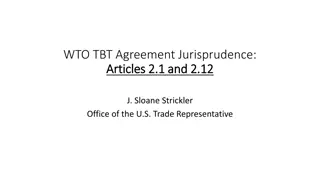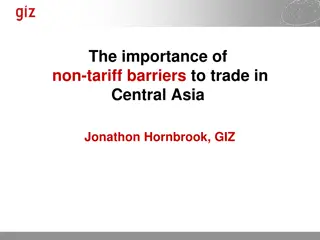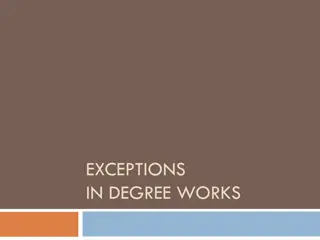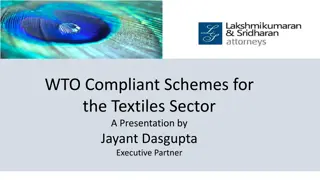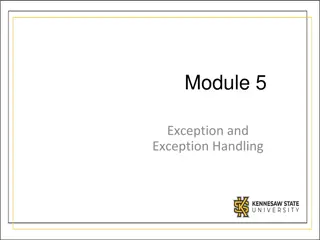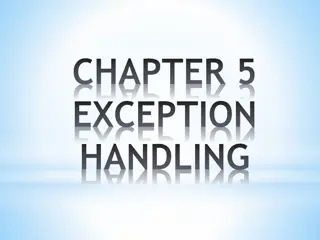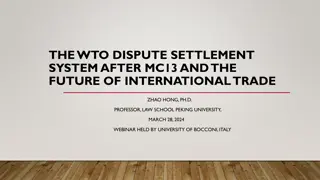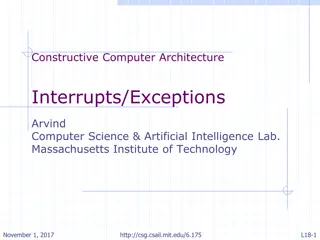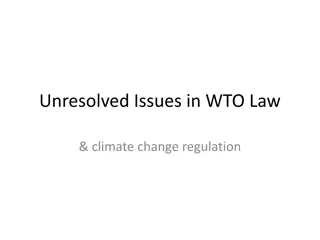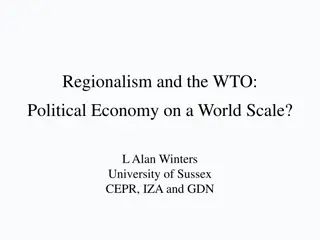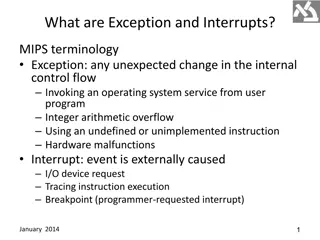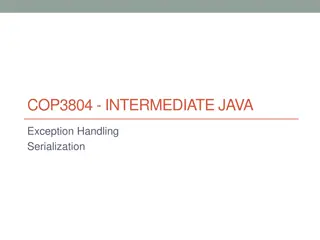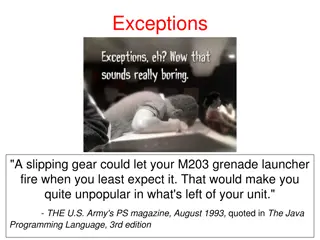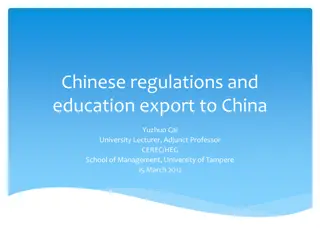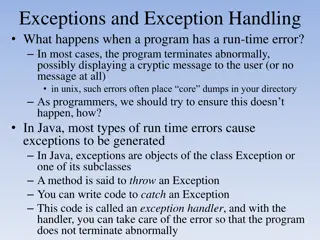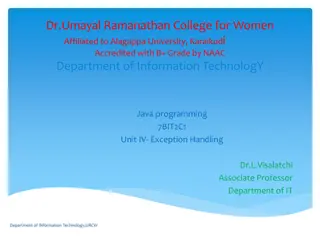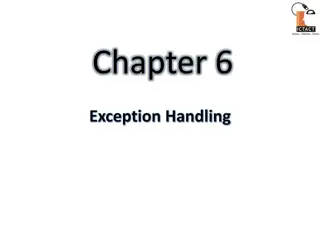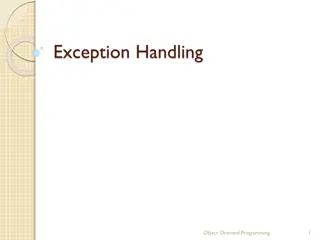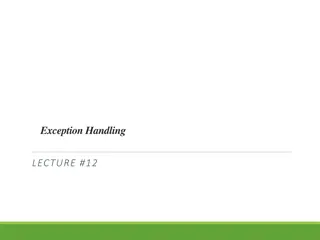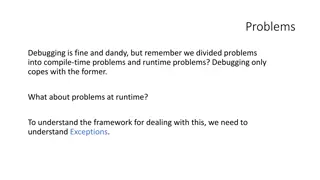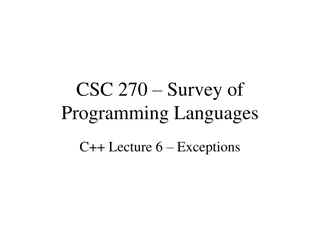LP&L RMS Update Clint Gardner, Chief Customer Officer
Explore the requirements and exceptions for obtaining business licenses in Lubbock, Texas, covering issues such as defining electricity as a good, license requirements for various sales channels, exemptions for town hall events, licensing for pop-up promotions, consulting with property managers in m
0 views • 14 slides
Postal Ballot Guidance Plan: Understanding Exceptions and Entitlements
The guidance plan delves into the exceptions to the voting in-person norm, focusing on Postal Ballot as an alternative method. It covers the entitlement categories of voters, such as Service Voters, Special Voters, and those under Preventive Detention. The presentation details the process of prepara
1 views • 63 slides
Review of Lesson 62 VCe Exceptions
This review covers exceptions to the VCe pattern in Lesson 62, focusing on when to use and recognize VCe words. The lesson includes slides highlighting key points for better understanding.
0 views • 78 slides
WTO Ratifications and Notifications Update February 2020
The WTO Secretariat shared good news on the implementation of Trade Facilitation Agreement commitments by developing members. Significant progress was reported, with several countries achieving full implementation. Additionally, 18 LDC members have provided indicative dates for their commitments ahe
0 views • 14 slides
WTO Ratifications and Notifications Update April 2021
Update from WTO Secretariat on ratifications, notifications, and deadlines. Information on ratifications and notifications status for various countries and entities, including the European Union. Details on upcoming notification deadlines for LDC members and notification requirements yet to be submi
0 views • 20 slides
Overview of the World Trade Organization (WTO)
The World Trade Organization (WTO) is an intergovernmental organization established in 1995 to regulate international trade among nations, replacing the General Agreement on Tariffs and Trade (GATT). It deals with trade in goods, services, and intellectual property, aiming to create trade agreements
2 views • 13 slides
Understanding Common Invoice Exceptions in Guided Buying
In guided buying, invoice exceptions play a critical role. Learn about common invoice exceptions such as price variances, quantity discrepancies, and auto-reject scenarios. Discover how to handle these exceptions effectively to ensure smooth procurement processes.
0 views • 8 slides
Managing Exceptions in West Virginia University Office of the University Registrar
West Virginia University's Office of the University Registrar processes exceptions through Degree Works, allowing advisors to make edits on a case-by-case basis. Understanding exception types like Force Complete and Substitute is crucial for properly managing student records to ensure accurate acade
3 views • 14 slides
Understanding GATT General Exceptions in WTO Law
Explore the intricacies of General Exceptions under the GATT framework, focusing on purpose, applicability, and relevant legal provisions. Delve into the two-tier test applied in WTO case law and the burden of proof considerations, with a specific case study on US Shrimp. Understand the nuances of A
0 views • 10 slides
Understanding Hearsay Exceptions for Children in Legal Proceedings
Exploration of hearsay exceptions for children in legal contexts, including how out-of-court statements are considered, the importance of minimizing emotional trauma for children, and specific cases illustrating the application of special exceptions in child abuse situations.
1 views • 22 slides
Challenges and Opportunities for Sustainable Development in WTO Law
Efforts to align WTO rules with Sustainable Development Goals (SDGs) have met limited success, with key issues like plastic pollution and clean energy facing disputes and challenges. The rise of China's New Three exports in clean energy has sparked tariff disputes. The role of the WTO Appellate Body
2 views • 7 slides
WTO TBT Agreement Jurisprudence: Understanding Article 2.1 and 2.12
The WTO TBT Agreement's Articles 2.1 and 2.12 focus on ensuring non-discriminatory treatment for imported products compared to domestic and other countries' products. Article 2.1 emphasizes the concept of "like products" and examines competitive relationships between them to determine if they receiv
0 views • 22 slides
Overview of Technical Barriers to Trade (TBT) Agreement in WTO Law Class
The Technical Barriers to Trade (TBT) Agreement under WTO law addresses regulatory divergence costs on trade, covering information, specification, and conformity assessment for products and processes. It aims to harmonize technical regulations and standards while ensuring compliance without discrimi
1 views • 12 slides
Understanding Hearsay Rules and Exceptions in Legal Proceedings
Hearsay evidence, which is an out-of-court statement introduced for the truth of its content, is considered less reliable in court due to factors like lack of oath, inability to see demeanour of declarant, and absence of cross-examination. Various historical judgments and legal exceptions allow cert
0 views • 90 slides
Managing Unfair Trade Practices in Compliance with WTO
Unfair trade practices (UTP) encompass fraudulent, deceptive, or dishonest practices that are prohibited by law. The WTO provides remedies against UTP, allowing governments to address genuine harm to domestic industries. Kenya has taken steps to combat UTP by enacting the Trade Remedies Act and esta
3 views • 17 slides
Challenges and Solutions in Trade Barriers in Central Asia
Understanding the significance of non-tariff barriers to trade in Central Asia, this presentation by Jonathon Hornbrook discusses the impact of Russia's WTO membership, WTO policies, and the challenges faced due to NTBs, EDB trade, TBTs, and NQI issues in the region. It highlights the importance of
1 views • 13 slides
Understanding Exceptions in Degree Works
The exceptions in Degree Works allow for modifications to academic requirements, such as for completing rules, substituting courses, adding new course options, and applying specific courses to rules. These exceptions provide flexibility while ensuring academic standards are upheld. However, caution
0 views • 24 slides
Understanding Exceptions in Degree Works
Dive into the various exception types in Degree Works, such as Force Complete, Substitute, Also Allow, and Apply Here. Explore how these exceptions impact course requirements, credits, and student data, with caution advised for using the powerful Force Complete option. Learn about the flexibility an
0 views • 25 slides
Overview of WTO-Compliant Schemes for Textiles Sector
This presentation by Jayant Dasgupta, Executive Partner, discusses WTO-compliant schemes in the textiles sector, covering definitions of subsidies, permissible subsidies, prohibited subsidies, and the phase-out of export subsidies by developing countries. It also addresses the current status of Indi
0 views • 8 slides
Understanding Exception Handling in Java
Exception handling in Java is essential for dealing with potential problems that may arise during program execution. By implementing try-catch-finally blocks and throwing custom exceptions, developers can create more robust and secure applications. This article explores the basics of exceptions, the
0 views • 36 slides
Exception Handling in PL/SQL
Learn about handling exceptions in PL/SQL, understanding the block structure, different types of exceptions including system, named, unnamed, and user-defined exceptions. Explore how to explicitly handle exceptions in PL/SQL blocks with examples showcasing error handling scenarios like division by z
0 views • 18 slides
The Evolution of WTO Dispute Settlement System and Future of Global Trade
Explore the post-MC13 negotiation backdrop, challenges, and future developments in the WTO dispute settlement system. Delve into the historical progression of international adjudication, from consent to quasi-judicial processes, highlighting the potential for progress and the common challenges faced
0 views • 12 slides
Understanding Computer Architecture Interrupts and Exceptions
Computer architecture interrupts and exceptions are essential for handling external events and unexpected conditions during program execution. Interrupts are caused by external events such as I/O requests, timers, or hardware failures, while exceptions occur due to specific instruction executions. W
0 views • 19 slides
China in the World Economy: A Historical Overview and the Importance of GATT/WTO
Explore the evolution of China's economy from its period of isolation to becoming a pivotal player in the global trading system. Delve into key events such as Deng Xiaoping's economic reforms and China's admission to the GATT/WTO. Understand the significance of the GATT system and how it shaped inte
0 views • 105 slides
Challenges at the Intersection of WTO Law and Climate Change Regulation
Unresolved issues in WTO law regarding climate change regulation include concerns about the consistency of climate measures, environmental subsidies, processing methods, and technical barriers to trade. Emerging climate change policies raise two main WTO concerns: subsidies discrimination and differ
0 views • 68 slides
Understanding Regionalism and the WTO: Political Economy Dynamics
The text explores the influence of politics on the GATT/WTO and the rise of mega-regionals, highlighting the shift towards regulatory trade policies. It delves into the origins of multilateralism, non-discrimination principles, and challenges in negotiating regional agreements within the GATT framew
0 views • 24 slides
Exception Handling and Interrupts in MIPS Architectures
Exception and interrupts in MIPS play a crucial role in handling unexpected events and external requests efficiently. Exceptions include changes in control flow, arithmetic overflows, and hardware malfunctions, while interrupts are externally caused events like I/O requests. When an exception occurs
1 views • 29 slides
Understanding Exception Handling in Intermediate Java
Exception handling is crucial in Java programming to manage errors and unexpected events that can disrupt program execution. This article covers the basics of exceptions, throwing and handling exceptions, types of exceptions (checked and unchecked), and use of try, catch, and finally blocks. Learn h
0 views • 11 slides
Handling Exceptions in Java Programming
Problems can arise during program execution, ranging from user input errors to device failures and code errors. It is essential to handle these exceptions effectively to ensure the stability and reliability of the program. In Java, exceptions are represented as objects and categorized into different
0 views • 41 slides
Regulations and Education Export to China: Insights and Guidelines
Understand the Chinese regulations governing education export, including international agreements, domestic laws, and WTO commitments. Learn about key regulations, international organizations' impact, and China's stance on education services within the WTO framework.
0 views • 40 slides
Understanding Java Exception Handling
Java provides a way to handle run-time errors through exceptions, which are objects of the class Exception or its subclasses. By using exception handlers, programmers can catch and manage exceptions to prevent abnormal termination of the program. Java's exception hierarchy includes Throwable, which
0 views • 29 slides
Regional Integration in WTO Law: Cases and Exceptions
This presentation delves into the intricacies of regional integration in the context of WTO law, exploring legal provisions such as Article XXIV of GATT 1994 and relevant case law. It examines exceptions, waivers, and derogations related to regional integration, along with the Regional Trade Excepti
0 views • 15 slides
Bilateral Negotiations in WTO Accession Process Overview
Learn about the key stages and rules of bilateral negotiations in the WTO accession process. Understand the importance of multiple revisions, regional concessions, and internal organization in negotiating market access. Discover the complexities of tariff negotiations, types of tariffs, and the stra
0 views • 20 slides
Exception Handling in Java: Basics, Examples, and Importance
Understanding the concept of exception handling in Java, including what exceptions are, the difference between errors and exceptions, reasons for exceptions, how to handle them, and the advantages of exception handling. This topic covers the basics of handling runtime errors in Java programming and
0 views • 27 slides
Understanding Exception Handling in Java
Exception handling in Java is a crucial mechanism to manage runtime errors effectively. This article explains the concept of exceptions, advantages of using exception handling, types of exceptions (checked, unchecked, and errors), common scenarios like ArithmeticException and NullPointerException, a
0 views • 23 slides
Exception Handling in Java: Understanding Errors and Exceptions
Exception handling in Java is crucial for dealing with errors and exceptions that can occur during program execution. Errors and exceptions are conditions that disrupt the normal flow of a program, and understanding their differences is key to effective error management. This chapter covers the conc
0 views • 32 slides
Understanding Exception Handling in Object-Oriented Programming
Exception handling in object-oriented programming enables a program to manage and recover from exceptional situations during runtime errors. Java uses exceptions to represent errors, allowing methods to throw exceptions that can be caught and handled by the caller, thus separating error detection an
0 views • 21 slides
Understanding Exception Handling in C#
Exceptions in programming are runtime errors that can disrupt program execution if not handled properly. In C#, exceptions are represented by objects of the System.Exception class or its subclasses. Exception handling involves using keywords like try, catch, throw, and finally to manage errors and e
0 views • 37 slides
Understanding Python Exceptions for Handling Runtime Problems
Exceptions in Python are essential for handling runtime problems and preventing programs from crashing unexpectedly. By using try-except blocks, developers can catch and manage exceptions that occur during program execution, ensuring smooth functioning. Learn how to effectively utilize exceptions to
0 views • 15 slides
Overview of Exception Handling in C++ Programming
This content provides insights into exception handling in C++ programming, specifically comparing it to Java. It covers the differences in exception handling between C++ and Java, such as the absence of null pointer exceptions and divide-by-zero exceptions in C++. It explains how C++ deals with exce
0 views • 13 slides


